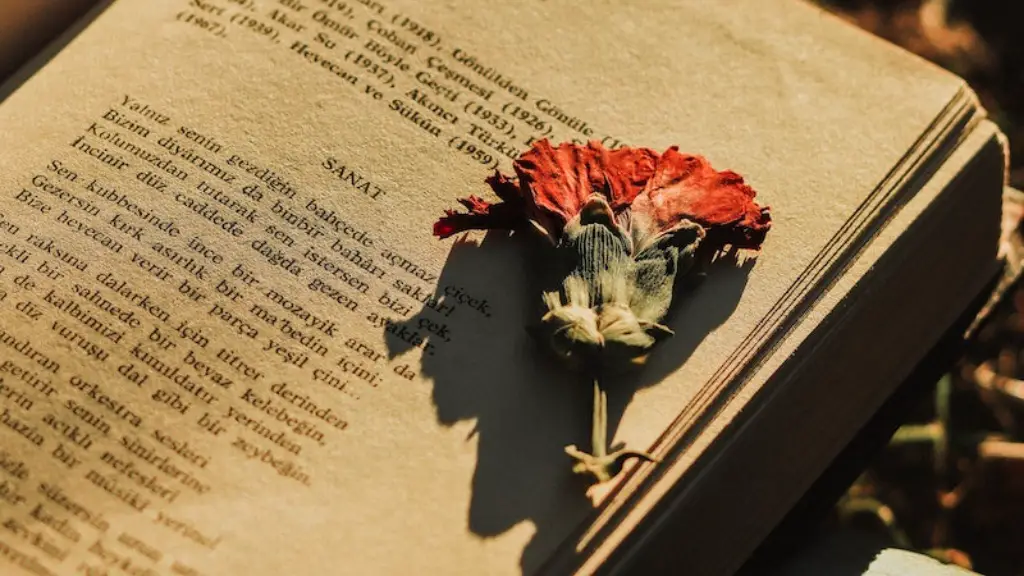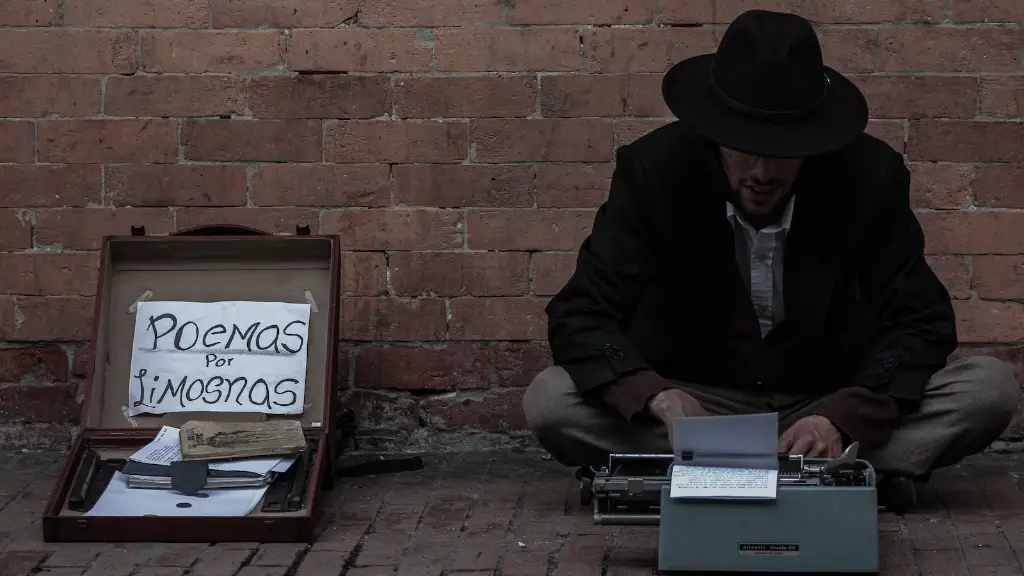Langston Hughes was an African-American poet and novelist who was a major figure in the Harlem Renaissance of the 1920’s and 1930’s. He is one of the best-known figures in African-American literature and his works have been widely anthologized and praised for their skillful blending of the blues aesthetic and racial pride. Hughes is often seen as the most significant black writer of the twentieth century, and his work has had an immense influence on generations of African-American authors.
One of Hughes’ most famous works is his poem ‘My People’, which was written in the early 1920s and became an anthem for Harlem Renaissance and African-American pride. It is Hughes’ best-known poem and its themes of black empowerment have been taken up by later African-American artists and writers. The poem paints a vivid picture of the struggles and beauty of the African-American experience, and serves as a rallying cry for black people around the world.
Another of Hughes’ most famous works is his novel ‘Not Without Laughter,’ which was published in 1930. It tells the story of a young African-American boy growing up in a rural Kansas town and is one of the first novels to frame poverty in the context of racism. The novel is an exhilarating, often funny, and ultimately heartbreaking tale of faith, family, and coming-of-age. It was a groundbreaking work, and has been cited as a major influence on later generations of African-American authors.
Hughes is also famous for his powerful and moving poetry, which often drew on the blues aesthetic and celebrated African-American culture and life. He wrote many classically structured poems that address themes of racism, poverty, and identity. His most famous poem is ‘Harlem’, which begins with the line “What happens to a dream deferred?” His poetry often speaks directly to the African-American experience, and has been an inspiration and source of comfort for generations of African-Americans.
In addition to his writing, Hughes was also active as a social activist. He wrote newspaper articles and other pieces that spoke out against racism and poverty and supported civil rights. His invective against racism and his passionate calls for social justice have resonated with generations of activists and insisted that African-Americans could not and should not accept inequality.
Today, Hughes’ work is still widely read and appreciated by readers of all backgrounds. His work serves as an enduring testament to his genius and his courageous fight for social justice. He stands as one of the most influential figures in twentieth-century African-American literature and as a powerful and beloved icon of American culture.
Langston Hughes in Performance
Langston Hughes was well-known as a dynamic performer of his own works, and made appearances at literary events and clubs throughout the United States, Europe and the Caribbean. He was also a frequent guest on radio and television programs and starred in a Broadway show in 1945 called “Langston Hughes: Weary Blues”. He was well-known and beloved by audiences, and his readings were frequently accompanied by musical accompaniment from jazz and blues singers.
Hughes was also part of a group of writers called the “Great Negro Poets”, which appeared on stage during the 1950s. The group included writers like Zora Neale Hurston and Countee Cullen, and their readings were an important part of the civil rights movement. The group’s performances helped to bring attention to African-American’s artistic achievements and encouraged more inclusive presentations of African-American life and culture.
Hughes was also involved in the works of other African-American writers, especially those of the Harlem Renaissance. He was a strong advocate of African-American literature, and he was instrumental in helping to get the works of the Harlem Renaissance published and showcased. He made sure that black voices were heard in the literary world, and his influence on American literature and culture is still felt today.
Legacy of Langston Hughes
The legacy of Langston Hughes is still felt today. He is remembered as one of the most important and influential figures in African-American literature and history. His work has inspired generations of authors, and his poems and writings are still widely read and quoted.
Hughes’ work is also still important to the civil rights movement, and many of his works are seen as rallying cries for the cause. His words have inspired countless activists, and his name and works are often cited in discussions about the struggles of marginalized and oppressed people.
The legacy of Langston Hughes lives on through his work, which continues to resonate with modern readers. He has come to symbolize black pride and resilience, and his work is a source of inspiration for those who seek racial justice.
Langston Hughes in Campuses
Many prominent universities, including Harvard and Yale, have began offering courses on Langston Hughes and his work. These courses are often interdisciplinary, combining the study of literature, history, music and culture. They explore the many facets of Hughes’s legacy, from his politics to his poetics to his unique role in popular culture. These classes provide a unique look at a canonical figure of American literature and art, and their popularity speaks to the enduring impact of Hughes’s work.
At the University of Wisconsin-Madison, for example, the Langston Hughes Initiative has been set up to study and celebrate the life, works, and influence of the acclaimed poet and novelist. The Initiative has held a Langston Hughes Conference every two years since 2006, which brings together scholars and students from across the country to discuss Hughes’s works and their relevance to today’s society. The Initiative also offers an annual Langston Hughes Iowa Writer’s Residency, which brings emerging literary talents to Madison to write and discuss Hughes’s works.
The influence of Hughes’s work and legacy can also be seen in the increasing number of academic and cultural organizations dedicated to his work. The Langston Hughes Association was founded in 2001 to celebrate the life and work of the poet and highlight the significance of African-American culture. Other organizations, such as the Langston Hughes Society, also strive to honour Hughes’s legacy through research and education.
Influence of Langston Hughes
Langston Hughes was an influential figure in American culture and the African-American literary tradition. He wrote groundbreaking works and was an important advocate for the civil rights movement. His poems and novels spoke of the struggle and beauty of the African-American experience, and his works are now seen as classics of American literature.
Hughes’ writing has had a powerful influence on subsequent generations of African-American authors, including Toni Morrison, Maya Angelou, and Alice Walker. His evocative and emotionally powerful writing is still inspiring writers today, and his work has been widely anthologized and celebrated in popular culture.
Today, Hughes is remembered as a powerful and inspirational figure in American history and culture, and his work is still widely read and appreciated by readers of all backgrounds.
Langston Hughes in Pop Culture
In recent years Hughes’s work has become increasingly popular in popular culture, and many of his works have been adapted for film and television. The 1999 TV movie “Langston Hughes: The Dream Keeper” starred Pulitzer Prize-winning playwright August Wilson and focused on the early years of Hughes’s career. The 2011 movie “The Great Debaters” featured a young Denzel Washington playing Hughes, and was nominated for a Golden Globe.
Many of Hughes’s works have also been adapted for stage, including the 1962 musical “Black Nativity” which retells the Nativity story with Hughes’s poems and songs. The musical was celebrated for its innovative use of Hughes’s poetry and has been performed in cities throughout the United States.
Hughes’ works have also been featured in popular music, notably in hip-hop and rap. The 1990 seminal hip-hop album “A Tribe Called Quest” featured samples of Hughes’s work, and many rap artists have cited Hughes as an influence on their work. Other musicians who have drawn on Hughes’s work include Bruce Springsteen, John Legend, and Nas.
The influence of Langston Hughes can also be seen in the increasing number of statues and memorials throughout the United States, including at his alma mater Lincoln University in Pennsylvania, which has a memorial garden of his poems. Hughes’s works, legacy, and writings are still very much alive in popular culture, and a fitting tribute to his legacy.





